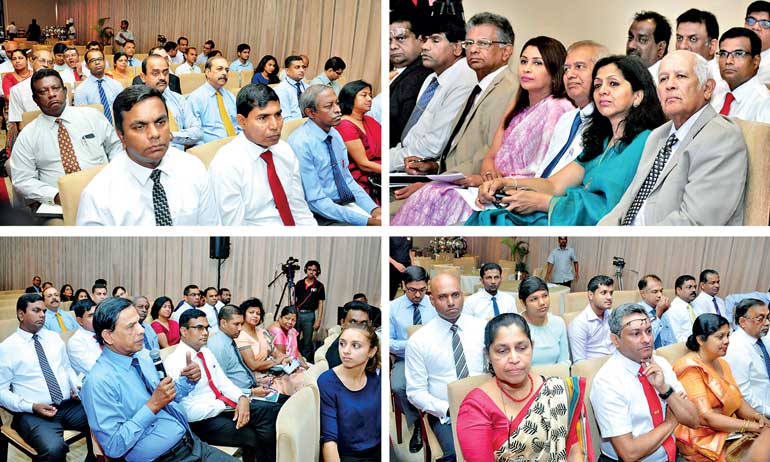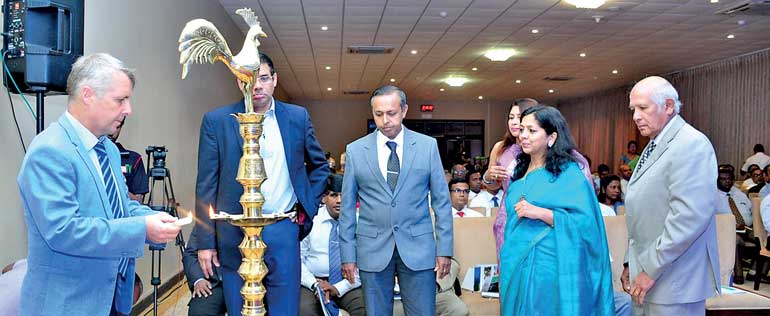Monday Feb 16, 2026
Monday Feb 16, 2026
Thursday, 15 February 2018 00:21 - - {{hitsCtrl.values.hits}}




From left: National Human Resource Development Council and International Chamber of Commerce Sri Lanka Chairman Dinesh Weerakkody, Moratuwa University Vice Chancellor Prof. Kapila Perera, Nestle Lanka CEO Shivani Hegde, German Ambassador to Sri Lanka Jörn Rohde International Institute of Health Science, Chairman Dr. Nihal De Silva and DIMO General Manager Ms. Dilrukshi Kurukulasuriya
By Shannon Jayawardena
German Ambassador to Sri Lanka Jörn Rohde yesterday highlighted the fact that Sri Lanka has a big skilling challenge, mainly due to the need for higher-quality education and that the trade has to be more attractive in order to achieve success.
He stated the above at ‘Lessons from Germany’s Dual Vocational Training System’, a discussion forum held on 14 February at the BMICH. The event was organised by the International Chamber of Commerce Sri Lanka (ICCSL) together with the National Human Resource Development Council (NHRDC), with the aim of creating insights on Germany’s vocational education, which is recognised for its combination of training embedded in a real-life work environment.
Ambassador Rohde said: “Although it says ‘Germany’s dual vocational training system: a model for other countries’, I would add a question mark on to it, because it is always difficult to fully transfer one system into another. While it is important to provide the proper skills for students, it is even more important to educate teachers as well.”
He stated that there are currently 1.34 million trainees in over 326 occupations in Germany while a total of 2.9 billion euros is spent for vocational education and training schools, out of which 1.85 billion euros is for steering, monitoring and support measures.
“These trainees spend two-thirds of the three years training in companies and one-third in the vocational schools. Of course, by this, they learn the practical part of the trade and gain the proper skills needed for compatible employment,” he added.
The primary characteristic of the dual system is the cooperation between organisations and publically funded vocational colleges. In Germany, approximately 50% of all school leavers go through vocational training, as it is considered the best way to enhance one’s skills.
In Sri Lanka, similar models have been practiced following the dual training system. The National Apprenticeship and Industrial Training Authority (NAITA) and the Ceylon German Technical Training Institute (CGTTI) follow the same norms, while following theoretical learning which provides the framework for better employable recruits. Yet there is still the need for quality education across the country.
Ambassador Rohde indicated that the reason for the challenge for proper skills is poor quality of education and low pay for professionals in the field. “Vocational education should have high regard on both ends. We need to make the trade more attractive, and the only way to do that is to pay higher salaries.”
Germany has been active in Sri Lanka for many years, having CGTTI in Moratuwa, railway institutes and hospitality institutes. The vocational college inaugurated in Kilinochchi two years ago, not only trains 400 graduates per year, but promotes higher proportions of women for professional labour. Similarly, one is currently being built in Matara, targeting the health and hospitality sectors.
“It is also very important to have a close partnership between the government and business communities, as it guarantees that the system is up-to-date. Living interaction with the schools will provide relevant and good information,” said Ambassador Rohde.
Pix by Lasantha Kumara